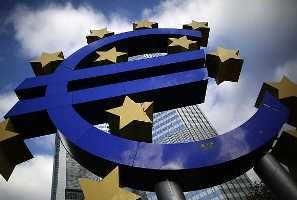 | « Back to article | Print this article |
Euro 60 bn/month bond buys might drive bulls in Indian markets
 On a day when the benchmark BSE Sensex breached the 29,000 mark for the first time, European Central Bank President Mario Draghi provided more ammunition to the bulls on Dalal Street.
On a day when the benchmark BSE Sensex breached the 29,000 mark for the first time, European Central Bank President Mario Draghi provided more ammunition to the bulls on Dalal Street.
Market players said Draghi’s announcement that the ECB would buy Euro 60 billion ($69 billion) of bonds a month beyond September 2016 would extend the rally in Indian markets.
With commodity markets remaining soft and uncertain, it is likely the money will flow into equity markets with strong upsides, such as India.
Rakesh Arora, head of research, Macquarie, said the markets had already run up in anticipation of more liquidity infusion by the ECB.
“This will lead to more inflows into India, which wasn’t the case in the past couple of quarters, and aid the pre-Budget hope rally.
“And, if the Budget delivers, the rally will go on for some more time,” he said.
The head of another foreign brokerage said when the US central bank had provided a stimulus, emerging economies were the biggest beneficiaries and a similar trend could be expected now.
“The ECB stimulus was long coming. It will inject life into risk assets across the world. “The immediate impact will be that the big unwinding we are seeing in commodity prices could be arrested.
“It will also lead to healthy inflows across emerging markets in general.
“Part of the stimulus will find its way into the Indian markets, as seen in the past,” said Saurabh Mukherjea, chief executive (institutional equities), Ambit Capital.
Higher foreign institutional investment will, in turn, lead to further expansion in equity valuations.
The biggest gainers will be financial stocks, followed by cyclicals such as capital goods makers and realty, metal and construction and infrastructure companies.
“While it’s good for equities in general, the biggest upside will be seen in banks and cyclicals, besides mid-caps.
“We also expect further expansion in the valuations of top names in the consumer sector such as fast-moving consumer goods, automobiles and consumer durables,” said Dhananjay Sinha, head (institutional equity), Emkay Global Financial Services.
ECB’s move will also lower interest rates in the international market, helping companies raise more low-cost foreign exchange loans.
The liquidity flow is expected to further weaken the link between stock valuations and the underlying corporate earnings.
This will increase volatility, as markets will react sharply to news flows.
This was visible in the case of Hindustan Unilever, which moved in a band of about 15 per cent last week; the stock declined about 10 per cent for two days, following the announcement of dismal earnings, but recovered sharply to a fresh high, as peer ITC reported lower earnings.
Increasing foreign capital flows into India and lower interest rates in international markets are also expected to give the Reserve Bank of India headroom to cut interest rates further.
This will provide cheer to companies and lending-linked businesses such as automobiles and home builders.
ECB’s move highlights the risk of deflation, forcing RBI to re-think its monetary policy, given the imminent danger of deflation in India.
The central bank is moving to a new consumer price index in which core inflation is much lower than what the previous index shows.
There are some concerns, too.
First, is the issue of how India deals with the inflows without the markets being overheated, as capital inflows put upward pressure on the rupee.
“RBI has to intervene to stabilise the rupee, which creates inflationary pressure in the system.
“In the past, RBI has raised concern over strong capital flows.
“There is a risk that these might increase,” said a fund manager with a foreign institutional investor.
Kamlesh Kotak, head of research, Asian Market Securities, said, “Though India will attract large flows in the current environment, on the flip side, such massive monetary easing underlines a key aspect --- the global economy is not out of the woods yet and the underlying weakness in the euro zone is likely to be prolonged.
“So, Indian exporters might face challenging times. In all, the era of high uncertainty and volatility might stay through 2015.”
Prabal Banerjee, president (international finance), Essar group, said it might be a case of too little too late, adding he doesn’t expect the move to make any difference to the Indian economy or companies.
Image: Euro currency sign is seen in front of the European Central Bank headquarters in Frankfurt. Photograph: Lisi Niesner/Reuters